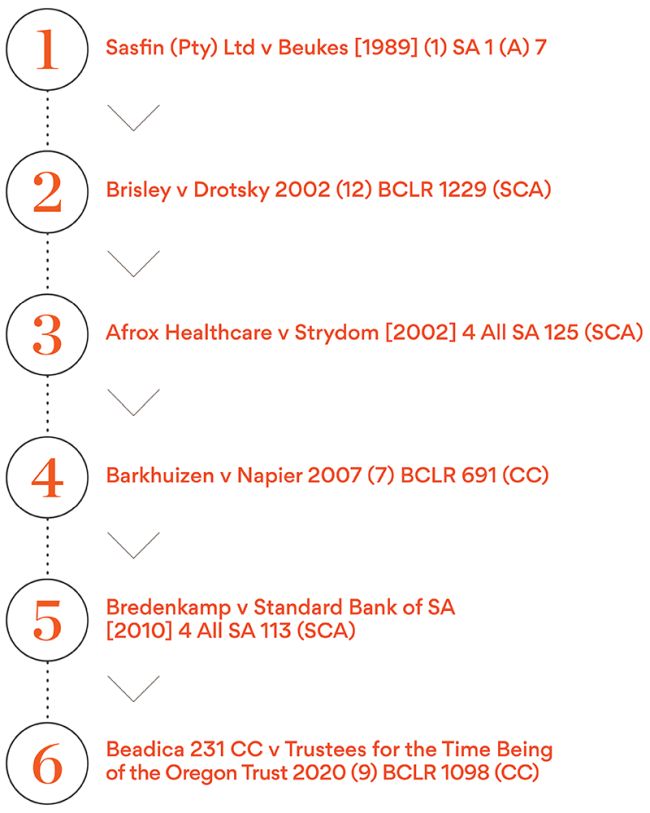Historically, the roles of fairness, reasonableness and good faith in the law of contract have been the subject of debate; one of the most controversial issues is whether a court can refuse to enforce a valid contract if it considers that the enforcement would be unfair, unreasonable, or unduly harsh. In light of this, our courts have developed principles governing the enforcement of contracts, through principles such as good faith and ubuntu.
In the distinguishable case of S v Makwanyane and Another 1995 (3) SA 391 (CC) 484, the Constitutional Court explains ubuntu as humaneness, personhood and morality. Metaphorically, it expresses itself in umuntu ngumuntu ngabantu, describing the significance of group solidarity on survival issues so central to the survival of communities. The court stresses that the spirit of ubuntu "...emphasises respect for human dignity, marking a shift from confrontation to conciliation..."
Since the advent of the constitutional dispensation, the principle of good faith now derives its force from the Constitution and the values enshrined within it. These values include human dignity, the achievement of equality and the advancement of human rights and freedoms, and the rule of law. Incorporated into our law as a constitutional value is the principle of ubuntu; ubuntu in turn, informs the principle of public policy.
HM Du Plessis, a senior lecturer in the University of South Africa1, makes a key distinction between the concept of good faith and ubuntu and provides that although both notions encourage contractual justice between the parties, ubuntu includes an additional duty to promote the parties' and community's social and economic well-being. As a result, unlike good faith, ubuntu is concerned with promoting substantive equality in private relationships
It is against this background, that we set out a timeline below on how the courts have applied the principles of good faith and ubuntu, which has influenced the interpretation of contracts over time.
Good faith and ubuntu, from a case law analysis:

- Sasfin (Pty) Ltd v Beukes [1989] (1) SA 1 (A) 7
-
- The court held that the interests of the community or the public are of paramount importance in relation to the concept of public policy. Furthermore, that agreements which are clearly inimical to the interest of the community, whether they are contrary to law or morality, or run counter to social or economic expedience, will accordingly, on the grounds of public policy, not be enforced.
- However, the court cautions that the power to declare contracts contrary to public policy should be exercised sparingly and only in the clearest of cases. Furthermore, that one must be careful not to conclude that a contract is contrary to public policy merely because its terms (or some of them) offend one's individual sense of propriety and fairness.
- Brisley v Drotsky 2002 (12) BCLR 1229 (SCA)
- This case laid the foundation in respect of the approach that governs the principle of good faith in the law of contract.In this case, the court held that the principle of good faith informs the substantive law of contract by performing a creative, controlling, and legitimating function.
- The Supreme Court of Appeal emphasizes, however, that good faith does not form an independent or a freestanding basis on which a court may refuse to enforce a contractual provision, and that accepting it as a self-standing basis would introduce an unacceptable state of uncertainty into the law of contract.
- Afrox Healthcare v Strydom [2002] 4 All SA 125 (SCA)
- The Supreme Court of Appeal held that courts do not determine the enforceability of contractual provisions based on abstract concepts such as good faith, reasonableness, and fairness, but only through applying established legal rules. The court further stated that although these principles form the basis of our legal rules, they are not themselves legal rules.
- Barkhuizen v Napier 2007 (7) BCLR 691 (CC)
- This case played a significant part in determining the role of good faith and ubuntu in the law of contract in South Africa.
- In this case, the Constitutional Court developed a two-stage
enquiry when determining fairness:
- The first step entails considering the question whether the clause itself is unreasonable and contrary to public policy and if the clause is found to be reasonable, the court will then look into the second inquiry.
- In terms of the second enquiry, the court will have to determine whether the clause should be enforced considering the specific circumstances of that particular case.
- Bredenkamp v Standard Bank of SA [2010] 4 All SA 113 (SCA)
- The Supreme Court of Appeal concluded that fairness was not a freestanding requirement of a contractual right and further crystalized the two-stage inquiry established in the Barkhuizen case.
- Beadica 231 CC v Trustees for the Time Being of the Oregon
Trust 2020 (9) BCLR 1098 (CC)
- The majority in the Constitutional Court emphasized that factors such as ubuntu, good faith, fairness and public policy play an important role in the application and interpretation of contract law. Most importantly these factors are necessary to establish substantive fairness in contracts. The application of these principles is facilitated through the rules of contract law and it is only where it is so unfair, unreasonable or unjust that it can be said that it is contrary to public policy.
Conclusion
The above case law emphasizes the position that principles such as good faith, fairness, reasonableness and ubuntu do not provide a free-standing basis upon which a court may interfere in contractual relationships but rather that the application of these principles is facilitated through the rules of contract law and it is only where it is so unfair, unreasonable or unjust that it can be said that a court may interfere with an agreement by considering principles such as good faith and ubuntu.
This article was prepared by partner Bianca Da Costa, senior associate Andricia Hinckemann as well as candidate attorneys Barr-Mary Tyzack and Caleb Mapatha.
Footnote
1. Du Plessis H "Harmonising Legal Values and ubuntu: The Quest for Social Justice in the South African Common Law of Contract" PER / PELJ 2019 (22) – DOI http://dx.doi.org/10.17159/1727-3781/2019/v22i0a6457, page 19.
The content of this article is intended to provide a general guide to the subject matter. Specialist advice should be sought about your specific circumstances.



